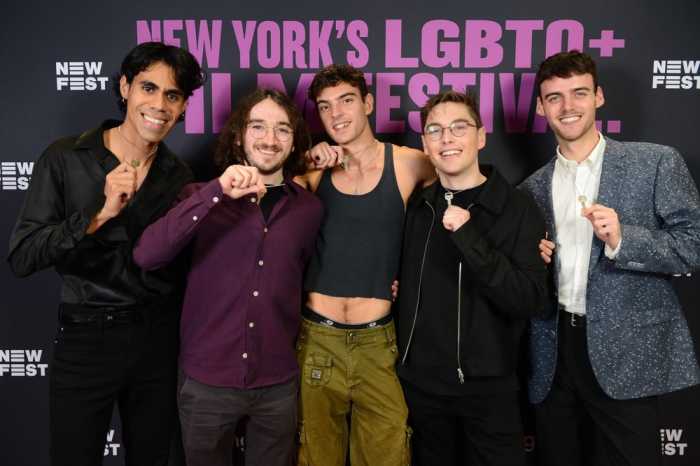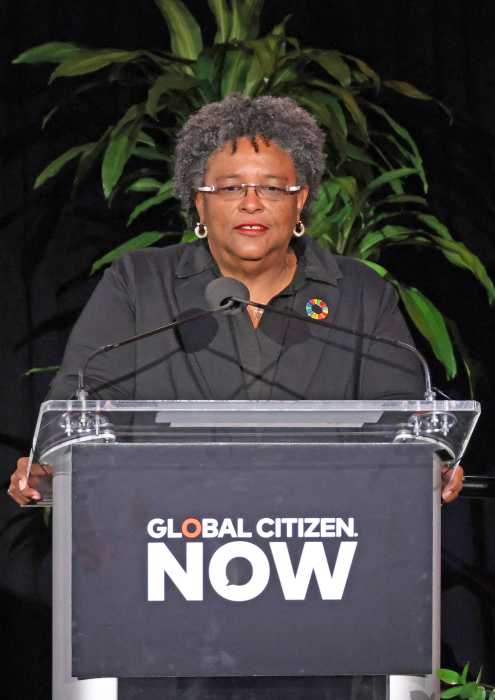From “Young Frankenstein”: “Penny for your thoughts… Oh… Where you going?… Oh, you men are all alike. Seven or eight quick ones and then you’re out with the boys to boast and brag. YOU BETTER KEEP YOUR MOUTH SHUT. Oh… I think I love him!”
This brief but brilliant monologue, written by Gene Wilder and Mel Brooks, is the pithiest and wittiest encapsulation of not only an entire relationship but the entire, eternal male-female battle since time began. And, as delivered by Madeline Kahn, it is the perfect crystallization of her sublimely unique and mercurial talent, breathtakingly encompassing, in about 30 seconds, post-coital sensuality, bewilderment, intense hurt, and fury — and then sudden romantic awareness.
This film remains the only one to literally make me fall out of my seat with laughter, but we all have our favorite Madeline moments: Ryan O’Neal’s hysterically snippy fiancée Eunice in “What’s Up Doc?”; her touching, funny Trixie Delight in “Paper Moon”; her ultimate Dietrich spoof in “Blazing Saddles” (“It’s twue! IT’S TWUE!”); absolutely killing it, singing “Find Me a Primitive Man” in “At Long Last Love”; Empress Nympho in “History of the World, Part 1,” going down the line of her stud stable of slaves, assessing their endowment (“Yes, yes, no, yes, no, no”), and many more.
William V. Madison’s impressive bio captures an elusive, brilliant, complex talent
Probably no one has more of them than William V. Madison, who has written her biography, “Madeline Kahn: Being the Music, A Life” from the University Press of Mississippi. It’s a labor of real love and a stunning achievement to rank alongside Tad Mosel’s “Katharine Cornell,” Brooke Hayward’s “Haywire,” Simon Callow’s “Charles Laughton,” and the very few other really terrific theatrical bios. Exhaustively researched and perceptively written, with the added bonus of Madison’s considerable musical savvy (he was my editor for a time, at Opera News), we get a full-scale portrait of a highly gifted, highly complex woman, whose genius often came at a high price for her, both emotionally and intellectually. In a business which favors the bottom line and the attendant unimaginative type-casting, Kahn may, unfortunately, have been too intelligent for her own good, and felt the insensitivity of others keenly, often being frustrated by the limits of what she was allowed to do and even completely excised from high-profile projects she had given her all to (like Woody Allen’s “Shadows and Fog”). It is, therefore, something of a miracle that so much of her eternally effervescent work survives on film and recordings, and this will continue to inspire generations of performers and fans to come.
I asked Madison what made him want to write about her and he said, “She’s a beloved performer — people really want to connect with her, even beyond what she gave onstage and onscreen. And she and I have similar tastes and have worked in related fields. My background writing about opera persuaded her family that I could tell her story. I first saw Madeline in ‘From the Mixed-up Files of Mrs. Basil E. Frankweiler’ (1973), in which she has a very funny cameo as a harried schoolteacher. It’s likely that I saw her in ‘Harvey’ the same year, onstage with Jimmy Stewart and Helen Hayes. But the first time she really registered was ‘Young Frankenstein’ in 1974. That was the first grown-up movie I was allowed to see by myself, at a late-night screening. “
The book took seven years to write: “I began by visiting Madeline’s brother, Jeffrey, at his home in Virginia. He’s the unofficial archivist, keeping all of Madeline’s scrapbooks and recordings and videos of just about all her work. You asked about her journals, which I quote from: there’s only one! That’s how meticulous she was, keeping the same notebook for 20 years. Jeffrey inherited it, and I discovered something really touching. After 20 years of recording her occasional feelings and observations, Madeline handed the notebook to her niece, Eliza, who was a little girl at the time, probably visiting her aunt in New York City. The final pages are given over to Eliza’s drawings, including an especially cheerful and welcoming Statue of Liberty.
“Jef is a terrific, kind, and remarkably laid-back guy who adored his sister. He gave me free rein to ask anything of anybody as I went about my work. He felt strongly that the overall merit of Madeline’s work and the fundamental goodness of her character would outweigh unpleasant lapses and flaws, so that he had no problem with my discussing some of the less than positive aspects of Madeline’s life. He never interfered at all with my work, and that’s almost unheard-of among heirs working with biographers.”
Madeline Kahn in Mel Brooks’ 1974 hit “Young Frankenstein.” | 20th CENTURY FOX
Like many another formidable diva — Streisand, Bette Davis, Ginger Rogers, Judy Garland and, of course, Liza — a formidable mother figured in Kahn’s life, and Madison said, “I also spoke with Paula Kahn, Madeline and Jef’s mother, who was in a nearby nursing home. She actually flirted with me when I met her, about four years before she died. Her memory was bad, she said, and she couldn’t answer my questions — except to tell me she thought I was handsome. Basically, she was doing what she could to make sure I treated her favorably in the book.
“Paula was just 18 when she had Madeline, and she harbored ambitions to be a star herself. But she didn’t have the discipline her daughter did, and to complicate Madeline’s life further, Paula was manipulative, mentally erratic, and she spent extravagantly. Madeline worked constantly, in large part because she had to support Paula. But Paula was Madeline’s first voice teacher, and she gave her the talent and skills to succeed and to build the legacy we still enjoy today. If not for Paula, Madeline might have pursued her own dream — which was to teach, not to perform.”
As to the reasons for Kahn’s complexity, Madison said, “She was indelibly marked by abandonment, by her father, her mother, and her stepfather in succession, while she was still a child. Between marriages, her mother shipped her off to boarding school, beginning when Madeline was five years old. She was terribly lonely there. Her fathers both left at a time when she felt ugly, which made her even more anxious about her appearance than most other actors are. The lesson she learned early was that people will leave, and she tried to resist that by making herself irreproachable. She was refined, impeccably dressed, using flawless spelling and punctuation even in her appointment books — nothing at all like the character she played in ‘Blazing Saddles.’”
It’s hard out there for a diva, especially when it comes to finding the right partner, and I wanted to know if Kahn ever achieved real personal happiness in a relationship: “A lot depends on how one defines true love! But Madeline found strength and sustenance in her relationship with her first boyfriend, Michael Karm, who was her co-star in ‘Two by Two’ and also her acting coach, helping her with her roles in ‘Paper Moon’ and ‘Young Frankenstein,’ among others. Her relationship with her last boyfriend, John Hansbury — whom she married — was her longest lasting, and I’m really not sure what she’d have done without him during her final illness.”
Kahn died of ovarian cancer in 1999 at age 57.
The list of Madison’s 120 interviewees is impressive: “Cybill Shepherd turned out to be one of Madeline’s fiercest advocates — something Madeline would find astonishing, because she really didn’t feel they’d made a connection during the filming of [the legendary musical debacle] ‘At Long Last Love.’ When we spoke about that movie, [co-star] Eileen Brennan suddenly exclaimed, ‘God, I love music! Music means more than anything in the world to me! Even more than dogs! Even more than cats!’ I say this with respect and affection: late in life Eileen was kind of a crazy cat lady, and she seemed to know that and to exult in it.
“Mel Brooks concluded one of our interviews by saying, ‘Kid, I want you to do me a favor. Don’t make this a long, boring book!’ I promised him to write that on a piece of paper and to tack it over my desk.”
Kahn is on many theatergoers’ minds these days because of the revival of “On the Twentieth Century” starring Kristin Chenoweth (so big a fan of Kahn’s that her dog is named Madeline), which was perhaps Kahn’s professional nadir. It was such a high profile project created for her, but the demands of the Cy Coleman score, among other considerations, proved too much for her, and soon her understudy, Judy Kaye, took over, triumphed in it, and became a star. I saw Kahn in it and remember being disappointed by how wan she seemed in the flamboyant part. Her talent, although exquisite, may have been more on the miniaturist side, its finely wrought details more suited to the intimacy of film. She could be highly variable onstage and was also disappointing in the revival of “Born Yesterday,” but, years later, at a Rodgers & Hart tribute at Symphony Space, she completely stole the show with a side-splitting rendition of “Zip.”
Of her voice, Madison said, “She was a lyric soprano with solid musicianship and a bright, flexible instrument. There are dozens of soubrette roles she could have and should have sung. Beyond that, opinions vary among her friends as to how powerful her voice was and what her potential was. Maurice Peress, her conductor for ‘Candide’ and ‘La Bohème’, believes she could have had a career like Callas; others seem to think she’d have been ill-advised to stray far beyond operetta and Mozart. But her friend Robert Klein [with whom she had a brief dalliance] probably summed it up best: Madeline’s singing ‘was not living room bullshit.’”
What was Madison’s ultimate takeaway, after devoting seven years to writing this life?: “Many people seem smaller, the more one studies them. Madeline Kahn wasn’t one of those people. I’ve learned a lot about her, and while I hope I haven’t developed a proprietary, projected, overly personal attitude toward her, I do still like her tremendously. When she was at her lowest ebb, during the run of ‘On the Twentieth Century,’ she was in many ways at her most admirable. The experience might have broken another woman — certainly the universe seemed to be trying to break Madeline. But in her persistence, she showed real courage.
“Her true legacy is her body of work. She often complained of typecasting, beginning when she was still in college, and I know she’d like to have left us more serious, dramatic performances, or more delicate work, like her final film, Eric Mendelsohn’s ‘Judy Berlin’. But she left us several movies — and TV appearances, too — that endure because they make us laugh in ways that are by turns subtle and outrageous, silly and smart, always surprising and inimitably her own.
“Only occasionally do I run into people in their 20s who don’t recognize her name or her face. ‘What’s Up, Doc?’, the Brooks movies, and ‘Clue’ are still popular even among school kids. When I started the project, I was astonished by the love people feel for Madeline. Even on the Internet, the trolls — if there are any — are affectionate and full of praise. And her fans are truly ardent. Many times, in conversation with strangers, when I’d mention that I was writing Madeline’s biography, people would get so excited, they’d practically levitate.”
Madison recently did a Kahn panel and book-signing at the Drama Bookshop: “Everyone who agreed to participate in the panel discussion showed up, and we had an overflow audience on the sales floor upstairs and in the theater downstairs. People really want to share their stories about Madeline, and the response was tremendous. Now I look at pictures from that evening — with Robert Klein, Martin Charnin, Lee Roy Reams, Jonathan Lynn, and so many others — and I have no idea how this happened. The best moment, though, was when Joan Copeland, who just turned 93, sang her solo from ‘Two by Two,’ note- and word-perfect, just for me and my friend Penny.”
MADELINE KAHN: BEING THE MUSIC, A LIFE | By William V. Madison | University Press of Mississippi | $35 | 336 pages
































